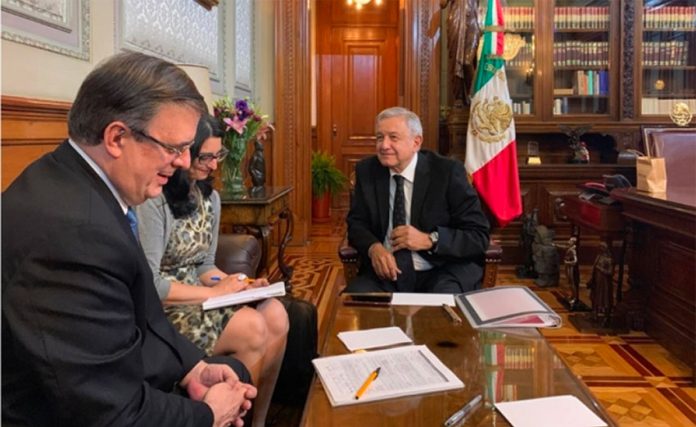President López Obrador said that he and United States President Donald Trump “reaffirmed” their commitment to a friendly bilateral relationship during a telephone conversation on Wednesday.
“We held a good telephone conversation with President Donald Trump,” López Obrador wrote on Twitter in a post accompanied by a photo of himself, Foreign Affairs Secretary Marcelo Ebrard and another official.
“The will to maintain a relationship of friendship and cooperation between our people and governments was reaffirmed,” the tweet continued.
In his own Twitter post, Trump described the conversation with López Obrador as “excellent.”
He said they spoke about “southern border security and various other things of mutual interest for the people of our respective countries.”
In a subsequent post, the U.S. president said that “the southern border is becoming very strong despite the obstruction by Democrats not agreeing to do anything on loopholes or asylum.”
The United States Supreme Court ruled on Wednesday that the Trump administration could enforce its policy of barring most Central American migrants from seeking asylum in the U.S if they didn’t first apply for refuge in a country through which they traveled to reach the southern border.
Under the policy, citizens of El Salvador and Honduras must seek and be denied asylum in Guatemala or Mexico before they can apply in the United States. Guatemalans must seek and be denied asylum in Mexico. Exceptions will only be made for victims of “severe” human trafficking.
Although legal action against the U.S. policy is ongoing in other courts and the case could return to the Supreme Court, Trump described Wednesday’s ruling as a major victory.
“BIG United States Supreme Court WIN for the border on asylum!” he wrote on Twitter.
The conversation between López Obrador and Trump came a day after Ebrard met with United States Vice President Mike Pence and Secretary of State Mike Pompeo at the White House to discuss Mexico’s progress in stemming migration to the southern U.S. border.
“The meeting took place on friendly terms,” Ebrard told reporters in Washington.
“[It was] nothing like what we saw yesterday from the CBP,” he added in reference to a comment from acting Customs and Border Protection Commissioner Mark Morgan that Mexico needed to do more to stop migration.
The foreign secretary said he outlined to United States officials “the Mexican strategy” that has been successful in reducing migration flows “in accordance with the law.”
Ebrard said last week that migration through Mexico to the United States declined 56% between May and August as a result of the deployment of the National Guard to increase enforcement against undocumented migrants as well as the government’s efforts to stimulate economic development in Central America.
At Tuesday’s meeting, the foreign secretary said that he also brought up the issue of arms trafficking from the United States to Mexico. Ebrard said that a binational group has been set up to monitor the issue and provide a monthly report about the illicit flow of weapons.
The Secretariat of Foreign Affairs said in July that firearms from the United States are used in seven out of every 10 high-impact crimes committed in Mexico.
A White House statement about the meeting on Tuesday said that Vice President Pence acknowledged Mexico’s “meaningful and unprecedented steps to help curb the flow of illegal immigration to the U.S. border since the launch of the U.S.-Mexico Declaration in Washington on June 7, 2019.”
It also said that Pence “commended” Mexico’s deployment of the National Guard and that the vice president and Ebrard “agreed that while progress has been made, more work remains in order to further reduce the flow of illegal migrants to the United States.”
In addition, the statement said that the two officials agreed to implement the Migrant Protection Protocols – the United States policy commonly known as the “Remain in Mexico” plan – “to the fullest extent possible.”
As part of the June agreement that staved off a threat from Trump to impose tariffs on all Mexican exports, Mexico agreed to accept the return of all asylum seekers that passed through the country as they await the outcome of their claims in the United States.
However, Ebrard said on Thursday that Mexico didn’t agree with yesterday’s ruling by the United States Supreme Court, which effectively makes Mexico a so-called safe third country.
The López Obrador government has resisted United States pressure to enter into a formal agreement that would commit it to hearing asylum cases from Central America and elsewhere.
Ebrard told reporters this morning that the designation of a safe third country “can’t come about by a court ruling by another country.
“It’s an agreement between two or more countries,” he added. “Mexico won’t accept it under any circumstances.”
Source: El Financiero (sp), El Universal (sp), Reuters (en)
